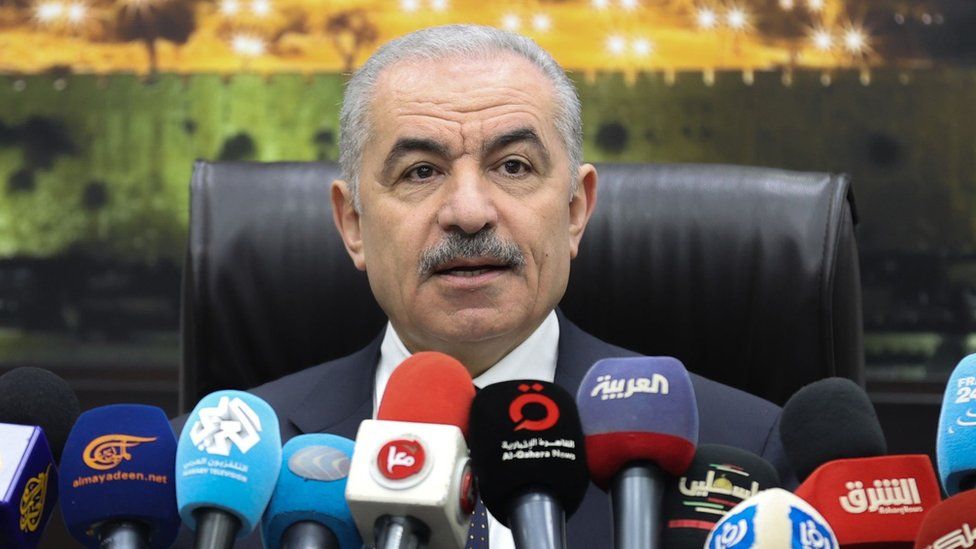Palestinian Authority PM Shtayyeh resigns citing new 'reality' in Gaza
- Published

Palestinian Authority (PA) Prime Minister Mohammed Shtayyeh has resigned along with his government, which runs parts of the occupied West Bank.
Mr Shtayyeh said new "arrangements" were needed to take account of the "emerging reality in the Gaza Strip".
President Mahmoud Abbas accepted his decision, which could pave the way for a technocratic government.
Mr Abbas is under pressure from the US to reform the PA so it could govern Gaza after the Israel-Hamas war ends.
Last week, Israel's Prime Minister Benjamin Netanyahu presented a vision for the territory that made no mention of any role for the PA.
The Israeli military launched a large-scale air and ground campaign in Gaza after Hamas gunmen killed about 1,200 people in southern Israel on 7 October and took 253 other people hostage.
Gaza's Hamas-run health ministry says at least 29,782 people have been killed in the territory since then, including 90 in the past 24 hours.
Mr Shtayyeh, an economist who has been in office since 2019, announced his government's resignation at a cabinet meeting in the West Bank city of Ramallah on Monday morning.
He explained that the decision "comes in light of the political, security, and economic developments related to the aggression against Palestinian people in the Gaza Strip, and the unprecedented escalation in the West Bank, including the city of Jerusalem", according to the official Wafa news agency.
"I see that the next stage and its challenges require new governmental and political arrangements that take into account the emerging reality in the Gaza Strip, the national unity talks, and the urgent need for an inter-Palestinian consensus based on a national basis, broad participation, unity of ranks, and the extension of the Palestinian Authority's sovereignty over the entire land of Palestine," he added.
Mr Abbas asked Mr Shtayyeh and his cabinet to stay on in a caretaker capacity until a new government is formed.
His preferred candidate for the premiership is believed to be Mohammed Mustafa, a US-educated economist and former senior World Bank official who is chairman of the Palestine Investment Fund.
He could be tasked with forming a new government of expert ministers not aligned to any factions, in the hope that Israel could be persuaded to let them govern Gaza after the war.
The PA, which was established in 1994 under the Oslo accords, has limited governance powers in parts of the occupied West Bank not under full Israeli control and is dominated by Mr Abbas's Fatah movement, Hamas's rival.
It lost control of Gaza in 2007, when Hamas ousted forces loyal to Mr Abbas a year after winning the last Palestinian elections, and is deeply unpopular among many Palestinians, both in the West Bank and Gaza.
In November, US President Joe Biden said Gaza and the West Bank "should be reunited under a single governance structure, ultimately under a revitalised Palestinian Authority, as we all work toward a two-state solution".
Secretary of State Antony Blinken said a reformed PA had to "meet the aspirations of the Palestinian people and deliver for them", including by combating corruption, engaging civil society and supporting media freedom.
Mr Netanyahu's plan for post-war Gaza, which he presented to ministers on Thursday, does not rule out a role for the PA. But it also does not specifically mention the body either.
It instead talks about handing responsibility for civilian management and public order to "local elements with managerial experience", who would "not be identified with countries or entities that support terrorism and will not receive payment from them". It also envisages a completely "demilitarised" Gaza, with Israel staying in charge of security for the foreseeable future.
A spokesman for Mr Abbas said the plan was doomed to fail.
- Published24 February
- Published13 September 2023